China’s Quiet Activists
China’s Quiet Activists
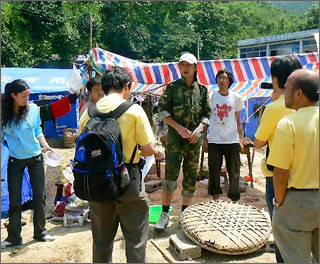
BEIJING: The emergence in December of human rights group ‘Charter 08’ in China and its prompt suppression received worldwide notice, but quiet acceptance by the government of another NGO group has gone unnoticed. Given the difficulty grassroots NGOs have in receiving government approval, the latest development involving a Sichuan-based group and harsh treatment of Charter 08 offer a telling example of the evolution in China’s civil-society movement: NGOs that tend to put the authorities on the dock are not to be tolerated, but civic organizations that quietly work to fill the lacuna in government’s work may now be welcomed.
The massive May 12 earthquake in Sichuan that brought an outpouring of public help and participation in relief work can now be seen as the harbinger of tolerance by the Chinese authorities, an experience that demonstrated to leaders the value of civil-society involvement.
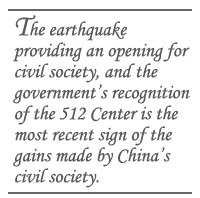
Seven months later, a diverse group of more than 300 Chinese citizens signed their names to a document known as Charter 08, calling for the expansion of civil liberties, rule of law and democracy in China. The document was released on December 9, just before the 60th anniversary of the Universal Declaration of Human Rights. In the days following, Chinese authorities launched a crackdown on the charter’s organizers that was condemned by Western human rights organizations and media.
While the drama of Charter 08 unfolds, a quiet form of activism plays out in Sichuan province where the devastating earthquake killed more than 80,000 people and displaced millions. There, an informal coalition of more than 30 NGOs, calling itself the Sichuan 512 NGO Services Center, work to coordinate NGO and other volunteer group aid efforts in the earthquake area. They slowly gained nationwide attention for their efforts and, recently, were given the ultimate seal of approval when provincial authorities encouraged them to register as a legal NGO.
The government’s recognition of the 512 Center is the most recent sign of the gains made by China’s civil society in the earthquake’s aftermath. Media reports, some published in YaleGlobal Online, described volunteers rushing to Sichuan to join the rescue effort, and ordinary citizens and companies donating millions of dollars in funds and supplies. In a country where responses to natural disasters have been government-led and organized, these events signal a surge in civil-society activity. But what’s not been clear until this latest news is whether this surge in grassroots mobilizing would be supported by the government and media and, more importantly, whether it would be institutionalized in some lasting form.
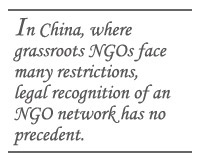
The development of the 512 Center is impressive given its short life. It was set up three days after the earthquake by NGOs from Sichuan and other provinces that had worked together in the past. In the midst of all the chaos surrounding the rescue and relief operations, organizers felt a platform was needed to provide NGOs with direction and to train volunteers before entering the quake areas. In June, the members met and decided to keep the center going. A memorandum of understanding was drafted concerning the center’s structure and long-term development, with funding secured from several foundations. By December, the number of NGOs that had signed on as center members grew from 21 to 38. When I went this January to provincial capital Chengdu to interview 512 center members, I knew that they still operated informally with the implicit approval of local authorities, meeting on a regular basis to coordinate activities in the earthquake areas. I was unsure how much longer they would last before the government decided that operations were no longer needed. I did not expect the government to ask them to register.
In China, where grassroots NGOs face many restrictions, legal recognition of a grassroots NGO network has no precedent. Onerous regulations make it difficult for NGOs to register and require that an NGO find a government agency to be its supervising unit. But finding an agency willing to take on the responsibility and risk of supervising an NGO, particularly one working in a politically sensitive area, is not easy. As a result, many grassroots NGOs end up registering as businesses or do not register at all. In addition to registration problems, NGOs lack domestic funding sources and must rely heavily on international funding. They are also viewed with suspicion by local officials and communities unfamiliar with NGOs.
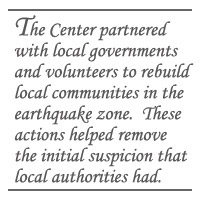
But such challenges are minimal compared to the obstacles faced by NGO networks which are actively discouraged by the government. In 2005, a network of environmental NGOs called the China River Network formed to protest the government’s plan to build a series of dams along the Nu River in Yunnan province. In part because of their efforts, the government decided to suspend building the dams. The China River Network, however, could not register and broke up after a year of existence.
The contrast between the fate suffered by the signers of Charter 08 and the opportunity extended to the 512 Center is striking. Even as the government cracks down on one form of activism, it condones another.
When asked why the government has not closed the center, members gave two reasons: First, they showed that they can play a valuable role in the earthquake rescue and reconstruction efforts. The center partnered with local governments, volunteers and other organizations to rebuild local communities in the earthquake zone. These actions helped remove some of the initial suspicion that local authorities expressed toward the Center. Secondly, the center’s influence has grown to the extent that authorities may feel that closure carries more risks than registration. In addition to its members, the center has support and funding from 80 other NGOs and private foundations from around the country and has been visited by hundreds of Chinese and international organizations, reporters and scholars. In December, it was named one of five influential public-interest organizations for 2008 by the independent-minded magazine, Nanfeng Chuang. It even received an award for its volunteer work from the local Communist Youth League.
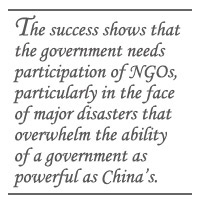
Yet another reason, one that remains unspoken, could be added to this list: The center has refrained from criticizing or confronting the government on sensitive issues such as the collapse of schools in the earthquake zone that led to accusations of shoddy building construction and corruption among local officials.
Members of the 512 Center know they’ve been handed a rare opportunity. They must negotiate with provincial authorities over the terms of registration and make difficult decisions about how to transform the center from a provisional, ad hoc network into an NGO with a long-term, sustainable mission. But whatever happens, the work of the 512 Center deserves attention as much as the political activism of the Charter 08 signers. If Charter 08 is grounds for pessimism, the story of the 512 Center, not to mention the many thousands of other grassroots NGOs in China, offers hope that civil society can advance by other means within an authoritarian framework. It signals recognition that the government needs the participation of NGOs, particularly in the face of major disasters that overwhelm even the ability of a government as powerful as China’s to deal with the social, environmental and perhaps even political problems that attend the aftermath of these crises.
Shawn Shieh is an associate professor of political science at Marist College in Poughkeepsie, NY, and co-editor, with Jonathan Schwartz, of a book on government and NGO responses to social welfare needs in China. He currently resides in Beijing where he is writing a book on social activism and civil society in China.